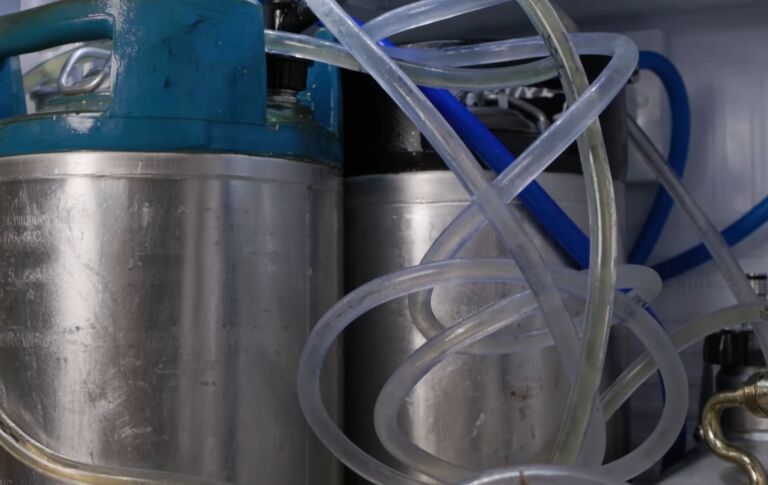Is Kirin Beer Gluten-Free?
For those who enjoy a cold brew but have dietary restrictions, the question of whether popular beers are gluten-free is important. Kirin, one of Japan’s oldest and largest beer producers, offers a range of lagers, ales, stouts, and more. However, it can be challenging to determine if their products are safe for the estimated 1% of the global population with celiac disease or gluten sensitivity. With the rise in gluten-free diets and demand for accommodations, companies have begun answering the call. So, what’s the verdict on Kirin beer? Is this Eastern staple off-limits or in the clear for gluten-avoiders? Let’s examine the facts.
In a Nutshell
Kirin beer contains gluten, so it is unsuitable for people with celiac disease or gluten sensitivity. Kirin, one of Japan’s most popular beer brands, uses barley malt as its main ingredient. Barley contains gluten, a protein that causes issues for people with gluten intolerance. While some beers are made from gluten-free grains like sorghum or rice, standard Kirin lagers, ales, stouts, and other products are not gluten-free. For those avoiding gluten, it’s important to check labels and reach out to manufacturers to confirm gluten content before consuming. Many brands now offer gluten-removed or low-gluten options, but standard Kirin beer does contain gluten.

Kirin beer ingredients
Kirin is one of the oldest and most well-known beer brands in Japan. The company offers various beers, from lagers and ales to stouts and pilsners. For those with dietary restrictions, like gluten intolerance, knowing what ingredients are used in Kirin beers can help determine if they are safe to drink. This article will overview the key ingredients in Kirin brews and identify which contain gluten.
Kirin Beer Ingredients
Kirin utilizes a classic combination of ingredients to make their beers. These include:
- Barley Malt – The primary ingredient in Kirin beers is barley malt. Malted barley provides the sugars needed for fermentation and gives Kirin beers their characteristic malty flavor. Different roasting levels lead to different styles, like pale malt for lagers or chocolate malt for stouts. Barley malt contains gluten.
- Hops – Hops are flower clusters used to add bitterness and aroma to beer. Depending on the style, Kirin uses various hops like Hallertauer, Cascade, and Willamette. Hops lend floral, citrusy, or earthy notes. Hops are gluten-free.
- Water – Water makes up about 95% of beer. Kirin sources soft water from places like Nigata, allowing the malt and hop flavors to shine. Water is always gluten-free.
- Yeast – Yeast ferments the sugars from malt into alcohol and CO2. Kirin uses ale and lager yeasts. Some beers also get finishing yeast for carbonation. Yeast gives beer its bubbly quality. Yeast does not contain gluten.
- Rice – Some Kirin beers use rice, like their Ichiban Shibori lager. Rice lightens the body, adds a crispness, and boosts drinkability. Rice is gluten-free.
- Other Adjuncts – Kirin may use small additions like corn, wheat, or flavorings, depending on the recipe. Corn lightens the body, while wheat adds haze. Always check labels for potential gluten sources.
Gluten-Containing Ingredients
After analyzing the components above, the key gluten-containing ingredient in standard Kirin beers is:
Barley Malt – All classic Kirin beer recipes contain gluten because barley malt provides the backbone of Kirin beers, giving them much of their flavor, color, and fermentable sugars. Only beers made entirely from grains like sorghum or rice or with special gluten removal processes would be gluten-free.
While other minor ingredients may pose a risk, like wheat, the use of barley malt in the brewing process means Kirin’s flagship lager, ales, stouts, and other beers made following traditional recipes are not gluten-free. Those with celiac disease or gluten sensitivity should avoid consuming standard Kirin products. Checking labels, contacting Kirin, and verifying gluten testing methods are recommended for gluten-avoiders seeking the most up-to-date information.
In summary, the primary ingredients in Kirin beers are barley malt, hops, water, and yeast. The key problematic ingredient for those avoiding gluten is barley malt. While rice, corn, and other gluten-free grains may be used in some products, Kirin’s standard beers are brewed from barley malt and contain gluten. Individuals with gluten concerns should be aware of this issue when considering Kirin brews.

Gluten content in Kirin beer
Understanding the gluten content in different beers is important for those avoiding gluten for medical reasons. Kirin, one of Japan’s top beer producers, offers a variety of popular lagers, ales, and stouts. But how does the gluten content compare, and why are Kirin beers not gluten-free? This article examines these key questions.
Gluten Content in Kirin Beer vs. Other Beers
Gluten content can vary between different beer brands and styles:
- Barley Malt – Kirin brews most beers using 100% barley malt. Since barley contains gluten, these products do not meet gluten-free standards.
- No Alternative Grains – Kirin does not substitute gluten-free grains like sorghum or buckwheat to make gluten-free beers. Some beers use rice, but not exclusively.
- No Special Processing – Kirin does not use special “gluten-removed” enzymatic processes. Normal brewing does not eliminate gluten.
- Not Labeled Gluten-Free – Kirin does not label any beers as “gluten-free” or claim to be safe for celiacs. Always check the packaging.
- Risk of Cross-Contamination – Shared equipment may introduce gluten during production, even if some ingredients are gluten-free.
- Lack of Third-Party Testing – Kirin likely needs to rigorously test finished beers to verify non-detectable gluten levels, a requirement for gluten-free certification.
- Contains Barley Malt – Since the ingredient lists for Kirin beers identify barley malt, they cannot be labeled gluten-free by law.
Therefore, standard Kirin beers likely contain over 20 ppm of gluten, on par with other regular barley-based beers. Those with celiac disease or sensitivity generally need to keep gluten consumption under 10-20 ppm. Kirin beer exceeds this level.
Why Kirin Beer is Not Gluten-Free
There are several reasons why Kirin beers do not qualify as gluten-free:
- Barley Malt – Kirin brews most beers using 100% barley malt. Since barley contains gluten, these products do not meet gluten-free standards.
- No Alternative Grains – Kirin does not substitute gluten-free grains like sorghum or buckwheat to make gluten-free beers. Some beers use rice, but not exclusively.
- No Special Processing – Kirin does not use special “gluten-removed” enzymatic processes. Normal brewing does not eliminate gluten.
- Not Labeled Gluten-Free – Kirin does not label any beers as “gluten-free” or claim to be safe for celiacs. Always check the packaging.
- Risk of Cross-Contamination – Shared equipment may introduce gluten during production, even if some ingredients are gluten-free.
- Lack of Third-Party Testing – Kirin likely needs to rigorously test finished beers to verify non-detectable gluten levels, a requirement for gluten-free certification.
- Contains Barley Malt – Since the ingredient lists for Kirin beers identify barley malt, they cannot be labeled gluten-free by law.
So, Kirin beers are not considered gluten-free for a combination of reasons, including recipe formulation, brewing methods, testing procedures, and labeling standards. Customers should avoid them if following a strict gluten-free diet.

In summary, the standard Kirin beer lineup, including their lagers, ales, and stouts, contain approximately 20-40 ppm of gluten from the use of barley malt in brewing. Kirin beers are not produced from alternative gluten-free grains, undergo special gluten removal processing, or are rigorously tested to verify non-detectable levels. Therefore, Kirin beers are not gluten-free and should be avoided by those with medical gluten restrictions. Carefully examining labels and contacting Kirin with questions is recommended for gluten-sensitive consumers.
Gluten-free alternatives to Kirin beer
Enjoying a cold beer can be difficult for those with celiac disease or gluten sensitivity. Major beer brands like Kirin contain gluten, which causes issues for those who cannot tolerate it. However, a growing number of gluten-free beer options are available, allowing gluten-free consumers to enjoy a tasty brew. This article will look at some of the top gluten-free beer brands and how they compare in taste and quality to a popular gluten-containing beer like Kirin.
Gluten-Free Beer Brands
The gluten-free beer market has expanded in recent years as demand increases. Here are some of the top gluten-free beer brands to consider as Kirin alternatives:
Omission Beer: Omission is one of the most popular gluten-removed beer options. It starts as a gluten-containing beer but uses an enzymatic process to remove the gluten. Omission has several beer styles, such as their flagship Omission Pale Ale.
Glutenberg Beer: Glutenberg is a Canadian gluten-free beer made from sorghum, buckwheat, and corn. They offer beers like an American pale ale and red ale. Glutenberg promises bold flavor in a gluten-free formula.
Ghostfish Brewing Company: This brewery, based in Seattle, WA, specializes in gluten-free beers. They use quality ingredients like millet, rice, buckwheat, and tapioca to create IPAs, stouts, and pale ales.
Ground Breaker Brewing: Ground Breaker is an exclusively gluten-free brewery based in Portland, OR. They offer IPAs, porters, stouts, and dark ales brewed from ingredients like chestnuts, lentils, and sorghum for a rich flavor.
Dogfish Head Brewery Tweason’ale: This gluten-free beer from the popular Dogfish Head Brewery is made with strawberries, sorghum, and buckwheat. It offers a fruit-forward cider-like taste.
New Planet Beer Company: New Planet focuses on gluten-free craft beers using rice, millet, sorghum, and cassava. Their Belgian-style ales and IPAs have received awards.

Comparison to Kirin Beer
So how do these gluten-free beers compare to a classic gluten-containing beer like Kirin? Here are some key considerations:
Taste: Many gluten-free beers, like Omission, aim to offer a very similar taste profile to conventional gluten-containing beers. They often use a combination of grains and malted alternatives like sorghum or buckwheat to mimic the malty flavor of barley. However, some differences may be noticeable, particularly with very hoppy styles like IPAs.
Quality: Gluten-free beer brands have improved significantly in recent years when it comes to quality and drinkability. Many are well-reviewed for their authentic beer taste and aroma. However, the texture and head retention may differ somewhat from gluten-containing varieties.
Variety: One of the main differences is that the variety of gluten-free beer styles is more limited compared to what’s available with conventional beer. Certain styles, like wheat beers, are very easy to replicate with gluten. However, pale ales, IPAs, stouts, porters, and more are still available.
Price: Gluten-free beers cost a bit more than conventional ones. Part of this has to do with special ingredients and smaller batch production. However, many gluten-free beer brands are competitively priced.
Availability: Gluten-free beer availability was very limited several years ago, but it has expanded significantly. While smaller craft brands may still have limited distribution, beers like Omission and Glutenberg are now found in most major grocery and liquor stores.
While Kirin and other conventional barley-based beers contain gluten, many high-quality gluten-free beer options are now available. Brands like Omission, Glutenberg, and Ground Breaker allow those with gluten restrictions to enjoy the flavors of pale ales, stouts, and more. While the taste and texture may differ somewhat from gluten-containing varieties, these gluten-free beers offer an authentic beer-drinking experience. With improved quality and expanded availability, going gluten-free doesn’t mean having to give up enjoying beer.

FAQ
Does Kirin have any low-gluten beers?
No, Kirin does not make any claims that its beers are low-gluten. Many beer brands have worked on enzyme processes to reduce the gluten content in beers brewed from barley malt, but Kirin does not currently market any products as low-gluten or reduced-gluten. Those highly sensitive should assume their products contain regular amounts of gluten.
What about gluten-removed Kirin beer?
Kirin does not offer any gluten-removed beer options. Some breweries use special enzymes to break down barley malt gluten proteins and filter out the remaining particles. While not gluten-free, this helps reduce gluten levels. However, Kirin has not introduced any gluten-removed beers, so its products contain full gluten content.
Are there any Japanese beers that are gluten-free?
Yes, there are a few Japanese beer brands that offer gluten-free options. Suntory recently launched a gluten-free beer called The Magical Malt. It is brewed from corn, buckwheat, and rice to avoid gluten ingredients. Another regional gluten-free Japanese beer is Echigo Beer’s Kaze no Mori. Imported beers like Estrella Damm Daura are also increasingly available. Check labels carefully when shopping locally.
Is barley the only source of gluten in Kirin beer?
Yes, barley malt is the only gluten-containing ingredient used in standard Kirin beer recipes. Some beers also contain wheat, rye, or other gluten grains, but Kirin uses 100% barley malt as its base. Other ingredients like hops, water, rice, or corn are naturally gluten-free. However, due to the barley malt, Kirin beers contain gluten proteins.
How is Kirin beer processed? Could that affect gluten?
Kirin uses standard brewing methods, like mashing, boiling, fermenting, and filtering the barley malt and other ingredients. These typical beer-making processes do not remove gluten. Importantly, Kirin does not use any special “gluten-removed” enzymatic treatments. While fermenting can break down some gluten, studies show finished Kirin beer still contains significant residual gluten.
Related Video: GLUTEN FREE BEER made easy! [+Pale Ale Recipe]
Final Thoughts
While Japanese beer giant Kirin offers a diverse array of lagers, ales, stouts, and other brews, those with celiac disease or gluten sensitivity need to be aware that standard Kirin products are not gluten-free. Kirin uses barley malt as its primary ingredient, and barley contains gluten. For those following a strict gluten-free diet, enjoying a Kirin beer could cause adverse health effects. However, some beer brands are exploring gluten-removed options and alternatives like sorghum or rice-based brews to accommodate gluten-avoiders. With care in reading labels and contacting manufacturers, many with gluten restrictions can still enjoy a beer – but standard Kirin products would be off-limits. In the end, it comes down to individual needs and preferences. Moderation and caution are key for gluten-sensitive beer lovers.







